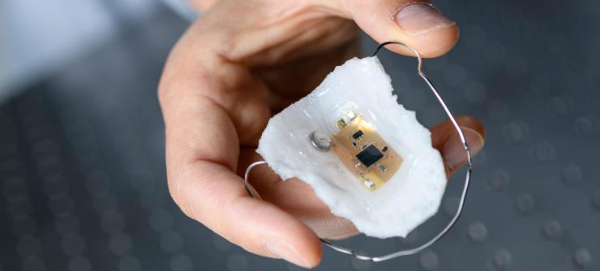
Hypertension, aka high blood pressure, is an increasingly common condition affecting one of two U.S. adults — often without symptoms — according to the American Heart Association (AHA). Hypertension increases the risk for heart disease and stroke, two of the most common causes of death in America, but many people don’t know they have it. High levels of ingested salt can raise blood pressure, which is why doctors often advise patients to reduce or eliminate table salt from their diets. They alsoprescribe diuretics to remove excess water and salt from their bodies. We have written about the advantage of telemedicine for managing chronic hypertension and improvements in home blood pressure monitoring devices.
Researchers at the Woodruff School of Mechanical Engineering and Institute for Electronics and Nanotechnology at the Georgia Institute of Technology have developed an ultrathin, flexible, and stretchable wireless sodium sensing system design to be worn in the mouth. The mouthpiece transmits salt intake data to an associated smartphone or tablet via Bluetooth. The engineers replaced traditional plastic and metal-based electronics with biocompatible, ultrathin components connected using mesh circuitry, which resulted in a thin, soft, and comfortable device. The details of the devices were reported in the Proceedings of the National Academy of Sciences.
Currently the size of a dental retainer, future plans including reducing the device to the size of a tooth. According to the Georgia Tech scientists, the AHA found many Americans can’t estimate how much salt they consume and those that do think they know their sodium intake significantly underestimate the quantity. An in-mouth salt sensing system could help people learn how to monitor their sodium intake and potentially reduce the need for medication.

